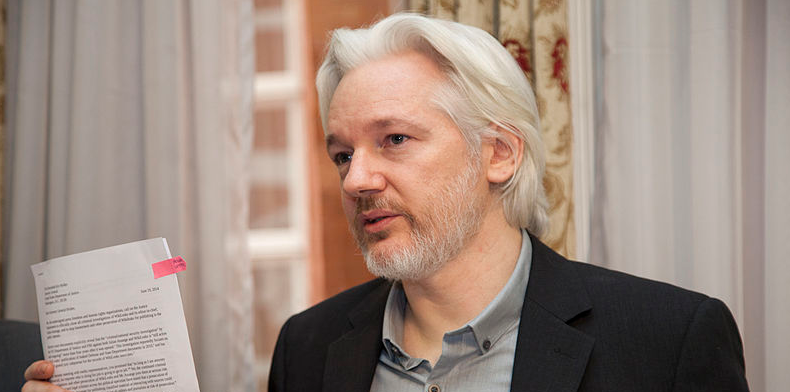Latin America Advisor
A Daily Publication of The Dialogue
Why Is Ecuador’s Government Reining in Assange?
 WikiLeaks founder Julian Assange has been holed up inside Ecuador’s embassy in London since 2012.
WikiLeaks founder Julian Assange has been holed up inside Ecuador’s embassy in London since 2012.
Ecuador’s government said Oct. 18 it had partly restricted Internet access for WikiLeaks founder Julian Assange, who has lived in asylum in the Andean nation’s London embassy for more than four years. WikiLeaks has been in headlines most recently for revealing emails aimed at embarrassing U.S. presidential candidate Hillary Clinton. Why has Ecuador, whose leader, Rafael Correa, often locks ideological horns with the United States, taken steps to restrict Assange now? Are Assange’s days under Ecuador’s protection numbered? What has been the role of the United States and other international actors in the latest developments?
Francisco Borja Cevallos, Ecuador’s ambassador to the United States: "Ecuador granted political asylum to Julian Assange in July 2012 because it considered that the situation had the required merits, and Ecuador has a long history of granting asylum to those persecuted for political reasons. Ecuador still believes the current underlying circumstances merit the asylum and will continue to safeguard his rights. In February, a United Nations panel determined that Assange’s time in the embassy in London amounts to an ‘arbitrary detention.’ Recently, Ecuador decided to temporarily restrict his access to the Internet following the decision to publish documents that have an impact on the election in the United States. The decision to publish those documents is the sole responsibility of WikiLeaks and its members. The government of Ecuador respects the principle of non-intervention in the affairs of other countries; it does not interfere in the electoral processes in progress, nor does it support a candidate in particular. There was much speculation surrounding the decision from Ecuador to restrict his Internet access, yet Ecuador’s foreign policy is solely based on sovereign decisions. Ecuadorean and Swedish competent authorities are collaborating to conduct interrogations at the embassy in London regarding the allegations against Assange."
Julio Carrión, associate professor of political science and international relations at the University of Delaware: "There are two explanations to account for Ecuador’s decision to restrict Assange’s access to the Internet. The first is that there is a long Latin American tradition of granting asylum to political dissidents with the understanding that the asylee will not engage in open political activism that might embarrass the host country. The other is that Ecuador feels that it is being put in the difficult position of being an unwilling participant in the Russian campaign to meddle in the U.S. election. There is very little doubt that Assange and WikiLeaks have become active collaborators in Putin’s efforts to undermine Hillary Clinton’s candidacy. And Assange was using the Ecuadorean embassy in London for this purpose. It was becoming increasingly untenable for Ecuador to claim neutrality in the ongoing conflict between Russia and the United States when it was hosting such a high profile hacker. So, despite Correa’s lack of enthusiasm for the Obama administration, he clearly thought that Assange was acting out of bounds with the Latin American tradition of asylum and was bringing attention to his administration at a time when he’s engineering a difficult campaign to secure the election of his hand-picked successor. Did the United States put pressure on him? Both the United States and Ecuador deny such pressure. Are Assange’s days of asylum in the Ecuadorean embassy numbered? I am skeptical. If Ecuador is able to curtail Assange’s open meddling in the U.S. election, there is no reason for a harsh action that could bring criticism to Correa from many that he sees as his natural allies."
Bruno Binetti, research associate at the Inter-American Dialogue: "For Ecuador, it made sense to help Assange in 2012, when WikiLeaks was revealing U.S. secret diplomatic cables and the surveillance Washington had ordered against allies and foes alike. Granting asylum to Assange allowed President Correa—a declared anti-imperialist and ally of late Venezuelan President Hugo Chávez—to defy the United States and raise his own global stature at a relatively minimal cost. Today, the situation has changed. There are indications of a connection between Russia and WikiLeaks, with the alleged intention of hurting Hillary Clinton’s campaign and (at least indirectly) benefiting Donald Trump, a candidate profoundly rejected in Latin America and the world for his divisive politics, and racist and sexist rhetoric. Ecuador risked being seen as intervening in U.S. domestic politics—just what Correa and others have been accusing Washington of doing in Latin America for decades. Expelling Assange from the Ecuadorean embassy in London would be a global embarrassment and the admission of a grave mistake. But with polls giving Clinton a comfortable lead over Trump only days before the election, Correa decided that Assange had become a problem to be contained. It is unlikely that Washington explicitly requested it, but Ecuador probably wants to avoid antagonizing a potential Clinton administration from the beginning. The South American country will elect a new president in 2017—Correa’s chosen successor now leads the polls—amid a serious economic slump. The United States remains Ecuador’s largest trading partner by far, and economic cooperation could help alleviate the ongoing crisis."
The Latin America Advisor features Q&A from leaders in politics, economics, and finance every business day. It is available to members of the Dialogue's Corporate Program and others by subscription.



















